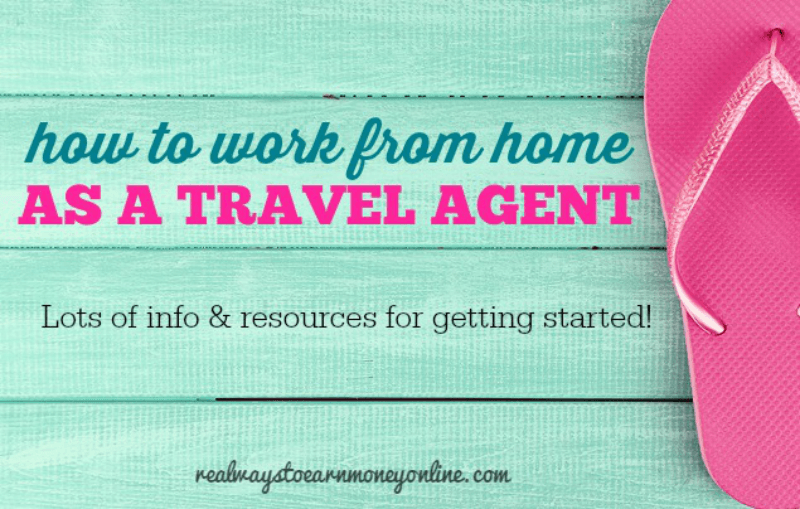If you have a genuine love for travel and are always helping your friends and family plan their vacations, then it’s quite possible you’d make a great travel agent!
And yes, this is a job you can do from home! Today’s post will cover the basics of being a home-based travel agent and then direct you toward some reputable travel agent work from home opportunities and resources to get you started.
What Travel Agents Do
As a home-based travel agent, you help people plan and book their trips.
This can involve arranging flights, hotel rooms, cruises, rental cars, tours, and sometimes even restaurant reservations. Many people find vacation planning stressful and would rather have a professional handle the details.
Some agents specialize in a niche, such as cruises, luxury travel, corporate travel, or Disney vacations. Others are generalists and book a broad range of travel.
How Do Travel Agents Get Paid?
Most travel agents earn money through commissions paid by travel suppliers such as hotels, cruise lines, or airlines.
Commissions are usually a percentage of the booking and are paid after the client has completed their travel. This means there can be a delay between when you book the trip and when you actually get paid.
Some independent agents also charge clients a service fee, especially for complex or custom travel planning. Others rely entirely on commission.
If you work for a travel company as an employee, you may receive a base hourly wage or salary plus commission. Independent agents working under a host agency typically earn commission only, with a portion kept by the host.
Do You Need Past Experience To Work as a Travel Agent?
You don’t necessarily need past experience to become a travel agent. Many companies provide training for new hires, and host agencies often offer courses to help you learn the basics.
That said, a background in customer service or sales can be helpful, but what matters most is being willing to learn and building up a client base over time.
Travel Agent Training
Most companies require some form of training before you start working.
If you work as an employee for a large company such as World Travel Holdings, training is usually provided and paid for.
If you work under a host agency as an independent contractor, you may be required to pay a startup or enrollment fee. This can include access to training materials, a booking system, and sometimes a personal website.
Many hosts will also charge ongoing monthly or yearly fees in addition to taking a commission split from you.
At Home Travel Agent Salary
The income for at-home travel agents varies quite a bit.
According to recent job postings I’ve found, remote travel agent jobs usually pay $16 to $24 per hour for employee positions.
As an independent agent working under a host agency, you can earn much more over time, but it may take years to build up a solid client base to make that happen.
Since most pay is commission-based, earnings are unfortunately inconsistent in this industry. Agents may have strong months during peak travel season and then very slow months during the off-season.
Benefits like health insurance or retirement plans are generally only available if you’re hired as an employee, not as an independent contractor.
Companies With Employee Positions in the Travel Industry
Some companies that periodically hire remote travel agents or travel customer service employees include:
These roles are more structured, typically requiring set schedules and providing employee benefits.
Reputable Host Agencies You Can Work Under as an Independent Contractor
If you want to work as an independent agent, a host agency can provide all the systems, licensing, and supplier relationships you need. Examples of this include:
Host agencies vary in what they charge and what support they offer. The companies listed above are not personal recommendations, but rather known options that appear to be legit.
As always, do your own research prior to signing up for anything or giving your personal information.
Red Flags to Watch Out For
Unfortunately, there are also many “opportunities” in this space that are closer to multi-level marketing than real travel agencies. To make sure you don’t get roped into something like this, watch out for the following:
- Hosts that emphasize recruiting other travel agents to work under you over selling travel to customers
- High startup fees with little training or support
- Agencies that don’t have established relationships with major travel suppliers
- Promises of unrealistic income with minimal effort
Always check reviews from current or former agents on sites like Host Agency Reviews or Reddit’s travel agent communities before signing up for anything you’re interested in.
The Pros and Cons of Being a Home-Based Travel Agent
Pros:
- Flexibility to work from home
- Discounts and travel perks for yourself
- Ability to specialize in areas of personal interest (like cruises or Disney)
- Can grow into a lucrative business over time
Cons:
- Commission delays (you may not be paid until months after booking)
- High competition in the industry
- Startup costs and ongoing fees if you work under a host agency
- Income can be inconsistent, especially in your early days as an agent
Is The Travel Agent Industry Dying or Evolving?
Time and technology tend to change all industries, as we know. So, I did some digging to see if being a travel agent is still worth it.
It seems the travel agent industry isn’t dying, but it has changed. In 2025, agents report that income can be modest when you’re starting out, with many earning a few thousand dollars in their first year. It seems like those who stick with it, specialize in a niche, and build strong client relationships often see their income grow steadily over time.
Some agents even report very high booking months, though this isn’t really the norm.
At the same time, the way people book travel is shifting. Big suppliers seem to be trying to get customers to book directly and bypass agents altogether, so the competition is strong.
Another thing to think about here is AI. The tools AI provides are also changing the industry, but not necessarily replacing human agents as yet.
That said, many agents are now using AI to draft proposals, manage itineraries, and handle repetitive tasks to make their jobs easier. This frees them up to focus on the things AI still can’t do like providing personal service, building trust, and solving problems when trips don’t go as planned.
So to sum up, while travel agents no longer have the guaranteed edge they once did, the field is evolving rather than disappearing. If you’re willing to work and adapt and embrace new tools, it could still be a viable and sometimes rewarding work-from-home career for you.
Helpful Websites
Looking For Even More Legit Remote Jobs?
FlexJobs is one of my favorite sites to use for finding remote jobs and learning about new companies that hire remotely.
Most of what I see there when I check the listings pays well above minimum wage and are known companies.
The great thing about FlexJobs is that they guarantee ALL listings are scam-free. They list hundreds of jobs — all of which are either remote or flexible in nature — five days per week.
There are also no ads on the site!
Because there are no ads, they do charge a membership fee since that is the only way they can see a return on their job-searching efforts.
But it’s cheap — you can get access for a few weeks for just $2.95 for 14 full days!
If you sign up and don’t like it, it’s very easy to cancel right away so you are not billed again. You can do it any point during your 14 days of checking things out.
Go here to check out FlexJobs.
Good luck to you!

Anna Thurman is a work at home blogger and mom of two. She has been researching and reviewing remote jobs for over 15 years. Her findings are published weekly here at Real Ways to Earn.

